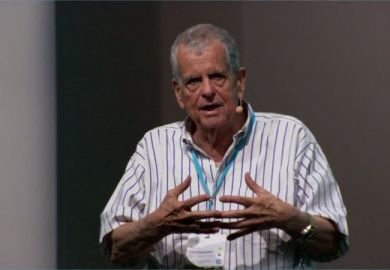The generosity of challenge
I didn’t know much about universities when I arrived at Wesleyan University in 1975. I was a kid from the suburbs of New York whose parents hadn’t gone to college and were more or less mystified by higher education.
Having injured myself repeatedly while trying to keep up with my friends’ athletic feats, I became very bookish and developed an interest in what at the time we called social studies. Still, I felt like a fish out of water when I got to Wesleyan. Many fellow students had been to fancy private schools; I’d known people in New York who went to private schools, but only because they’d been thrown out of public schools.
Hence, when I knocked on the office door of a young professor named Henry Abelove, I was practically shaking with fear. He was teaching a course on “Modern European intellectual history”, and while I wasn’t really sure what intellectual history was, I was drawn to it because it sounded, well, sophisticated.
I needn’t have been so nervous. Henry was (and is) among the kindest of humans. Sweetly and graciously, he explained that every week we would read a powerful book with historical resonance (both in its own time and in ours), and he gently reminded me that I would be able to handle the work.
I arrived to every class over-prepared, having read the book (from Voltaire’s Candide and Boswell’s Life of Johnson to Levi-Strauss’ Triste Tropiques) and taken copious notes, but left with my head spinning about how many more meanings we were able to glean from the text through our smart and caring teacher’s questions and discussion (never lecturing). I felt inadequate that I hadn’t hit upon those meanings in my own reading, but I don’t exaggerate when I say that it was life-changing to discover something totally new each week, not just about the books but about the world and about myself. Man, I loved going to those classes!

When I began teaching as a graduate student, I tried to mimic Henry’s mix of kindness and rigour. As part of that, I would approach the students and get close to them as I asked a series of questions. But they freaked out! “You’re too big, my dear,” explained Henry, who is a small person with a quiet voice, while I’m a tall, loud guy. So while Henry taught me to read with an intensity akin to his own, he (just as importantly) dissuaded me from trying to teach like him. I had to learn to be myself, or a version of myself, in the classroom.
I read Freud with Henry and wrote what became my first book on psychoanalysis (and later an exhibition at the Library of Congress) under his guidance. Henry became one of the founders of queer theory and gay and lesbian history. For me, he was a mentor who opened the world to his students.
The other great influence on me at Wesleyan was, in many ways, his opposite. Where Henry was welcoming and gentle, the philosopher Victor Gourevitch was (and meant to be) formidable. I wanted very much to earn his respect. And the only way to do that was to work very, very hard and to never think you had reached a firm conclusion about an important philosophical issue – or even about a passage in Hegel.
Someone would ask him a complex question about, say, The Phenomenology of Spirit, and Victor would turn to me and say: “Mr Roth, please read aloud the second paragraph of page 275.” He would then ask me if I understood a particular phrase. I’d offer a gloss, and then he would ask me about the third word, and so on. He would push and push with questions until I would admit that I didn’t know what the text was saying any more. “Ah,” he would say, “now this is a good place to start.”
Sure, such relentless challenge was sometimes frightening, but this invitation to think again about the things one thinks one knows was, from him, a sign of respect, even of friendship, and it was deeply rewarding. Victor took his students more seriously than they took themselves, and I came to learn that he was among the most hospitable people I’d ever meet. We became friends and eventually edited a book together.
A masterful translator of Rousseau, Victor wrote very little himself. I think he was amused that I wound up writing so much. In 2019, I sent him my then new book, Safe Enough Spaces, about free speech on campus. I didn’t realise at the time he was already near the end of his life. He wrote me a letter expressing his admiration for my indifference to the fact that none of the major philosophers in the Western tradition would agree with my conclusions. He then noted that our disagreements never got in the way of our friendship and wished me well.
From these and other mentors I learned generosity and openness, including these traits’ important connection to intellectual challenge. Forty years on and I am still learning from their example.
Michael S. Roth is president of Wesleyan University, Connecticut. His most recent book is The Student: A Short History.
The informal economy
I had always struggled with the idea of formal mentoring. How was it different from patronage? Did it not imply a relationship of hierarchy given that one person “guides” the other? Could this inequality ever translate into trust?
This scepticism might well have arisen because I never really had a mentor myself – at least, not when I was starting out in my career – and I hadn’t ever really felt the lack of one. There had always been people I could turn to, including PhD supervisors, peers and colleagues. It was their generosity that had made many of the opaque parts of the profession plain to me, and their example made me a staunch believer in informal mentoring as simply what we ought to do, as academics.
It was only when I moved to the University of the Witwatersrand in Johannesburg that I recognised the need for something more structured. This was for at least two reasons. As an academic who had made a transcontinental move and become a new parent at the same time, I felt the need for some guidance, even handholding. Second, as I settled into the job, I realised how much mentoring our students needed.
South African students face overwhelming life challenges, from gender-based violence to housing and money problems. Regarding those, the best I could do was to direct them to other (limited) sources of support. As a woman who supervises students in gender and sexuality, I felt acutely the need to put in additional academic and often emotional labour, such as providing writing resources and building students’ confidence.
I knew, however, what my main strengths were. Seeing how unevenly placed our graduate students were, and knowing from my own experience how much the academic profession relies on implicit know-how when it comes to major milestones like publishing and getting an academic job, I chose to invest my energies in offering professional development training to groups of graduates (even though some of my colleagues questioned the need for it).
My first stint of one-to-one mentoring took place as part of the African Feminist Initiative at Penn State, which pairs mentors with mentees in African gender studies, primarily located in the US or Africa. As a mentor, you are meant to check in virtually once a month with your mentee on a project or concern, which can include anything from navigating departmental dynamics to meeting tenure milestones to deepening one’s knowledge of a particular field.
I was assigned two early-career scholars, one in the US and another in a different African country. They had distinct needs and I came away with different experiences. Even though the other was closer to home geographically, I felt able to respond better to the colleague in the US given my familiarity with tenure systems there. But common to both was the inability to sustain the relationship over the six-month term. In retrospect, it might have been better to schedule regular meetings rather than leaving them to be called when need arose and time permitted (although we all know how hard it is for academics to carve out time, especially in advance).
During the pandemic, I encountered another form of mentoring when I tweeted offering to advise early-career scholars. I received voluminous interest, especially from students and early-career scholars who were, like me, of Indian origin, either in India or elsewhere. We spoke over WhatsApp, sometimes more than once. I shared whatever I could – cover letters for jobs, teaching materials, book proposals – and gave my time and advice freely. But I did wonder if I was best placed to help, given how locally specific the challenges sometimes were. Either way, it was clear that it was not merely because of the pandemic that students and scholars felt isolated and even lost. It was primarily because of the lack of training, supervision, support and care in the communities and institutions to which they belonged.
But while all of this might suggest the need for higher education institutions to formalise mentoring, I want also to continue to insist on the value of mutual informal support, guidance and sharing. Like many women professors, I have benefited enormously from the ad hoc care and counsel of others, invariably other women, and that fuels my own commitment to pay it forward.
Srila Roy is professor of sociology at the University of the Witwatersrand.
Holding hands against the darkness
“Look before you leap”, “fools rush in where angels fear to tread”, or even “the second mouse gets the cheese”: these are all good pieces of advice…sometimes. But at other times, so are “he/she who hesitates is lost”, “if you snooze, you lose” and “a stitch in time saves nine”.
If you think through all the mottoes you know, you’ll quickly appreciate that each one has an opposite. Accordingly, many mentors make light work, but too many mentors spoil the broth.
The trick is to have precisely the right number – the goldilocks number – of mentoring schemes and mentors. No one knows what that number is because it depends on the circumstances. But, usually, there are a lot – because “better safe than sorry”.
I have never been involved in a formal mentoring scheme, but I have benefited hugely from role models and informal mentors. That is particularly true of the people who were on the various committees that selected me for jobs – they wanted to have made the right decision, so they invariably supported me to settle in. I remember once saying, “my only fear is that I mess up this opportunity” and was told “don’t worry, we’re here to help you succeed”. If only everyone heard those words!
Another time, I was chatting with an informal mentor about a retiring head of school whom I had admired. I said I’d like to apply for that job but knew I was too young and wouldn’t get it. He immediately said, “You’re right: you won’t. But you should apply anyway because it will signal that you are keen and you’ll get other opportunities.”
I did, and it worked out like that.
Throughout my career, I’ve needed letters of recommendation and my formal mentors, doctoral and postdoctoral supervisors, have all been hugely generous. In the US, these people are actually referred to as mentors, rather than supervisors, as they are in Australia – and that reassures one that it is OK to keep bugging them for letters!
But I don’t bug them for advice. I observe them as role models and I pick and choose behaviours that seem beneficial to all, but since good advice is so context dependent, I rely on myself for decision-making. I don’t really think mentors should give advice – like good journalism, the idea should be “show, don’t tell”.
Over the years, I have seen many attempts to introduce new mentoring schemes. Many have over-promised. Some institutions, noting tightening research grant funding rates, see mentoring as the answer. But as each institution takes the same approach, the bar is lifted, and the total time spent supporting staff to apply and honing applications just goes up and up with no net winner.
We’re trapped in this arms race now, but we can convert it into something more useful – not a quest for higher success rates, but into a meaningful academic community.
When academia was smaller and less dependent on external funding, it was easier to feel part of the community. But now, with the vast scales of some institutions, hyper-competition for resources and increased remote working, it can be harder to find the right support networks.
We are called Homo sapiens, but all that supposed wisdom is not self-generated. Perhaps we would be better known as Homo collaborans; once we are connected, I’d say that we work more effectively than bees or ants (whose strict caste systems limit individual agency), or even than wolves or lions (whose pack-hunting by no means guarantees full bellies).

To be alone is crippling for humans. Holding hands against the darkness helps us get through. In the light, it magnifies success. Mentoring schemes have value if they ensure that no one feels unsupported. Many academics are shy. Many set high impossibly standards for themselves, so impostor syndrome materialises. And although academia is a relaxed profession, line management hierarchies still exist and to some extent limit what friendships are possible.
And while smart academics can emerge from any region or stratum of society, the majority still hail from relatively privileged backgrounds, meaning that, since “birds of a feather flock together”, not everyone will automatically feel part of the crowd and see natural partners. Hence, providing formal mentors is especially important for supporting under-represented groups.
Such schemes establish connections that boost productivity in the good times and support people through bad times. They also establish cultures of care and can inculcate codes of conduct more effectively than written policies can. They tame people. And, as Saint-Exupéry’s fox said to the little prince, “if you tame me, then we shall need each other”.
Good mentoring can establish self-supporting and mutually dependent communities and cultures that benefit everyone.
Merlin Crossley is deputy vice-chancellor academic quality at UNSW Sydney.
Cherish and compensate
Mentoring is a hugely important role. It is next to vital for a scholar to have allies, especially at the early- to mid-career stage. And while I don’t believe there is a set formula for being a good mentor or of how mentoring should happen, good mentors do share some key characteristics.
My mentors, both formal and informal, act as a sounding board for ideas I am thinking through. They give advice on how to frame arguments and places to publish. Most importantly, they talk through the bigger-picture stuff about how my work, teaching and career are evolving, offering advice on the challenges, boosting my morale and celebrating my successes. They talk through my job applications and, in some cases, write numerous references for me. I do not believe that I would be where I am, with a permanent academic position in a well-regarded department, without their enormous help.
I cherish my mentors. The best kind play their role out of a natural affiliation with you. Over the past 15 years, my own have included someone I met and bonded with at a conference; my PhD and master’s supervisors; my undergraduate tutor, who ended up becoming a colleague; a friend in a completely different area of my field who I met during a fellowship abroad; and someone who doesn’t even work in academia at all.
I’m not sure if they all even consider themselves my mentors, although I have tried to tell them that’s how I see them – even if it has only dawned on me later how much I have valued their advice and guidance. Nor have I had all of these mentors at the same time: they come in and out of focus, I have found, at different times and for different purposes. I now have a formal mentor, too.

Some people are very natural mentors, but, in my opinion, some open-ended training is important for anyone who is taking on the role formally, even if this just means an hour of discussion about best mentoring practices.
There certainly needs to be a procedure in place for assigning formal mentors to new colleagues. I didn’t have one for the first two years of my postdoc, because I fell through the administrative cracks. I didn’t ask about why I hadn’t been assigned one because I didn’t even realise I was supposed to have one. Instead, I leant on the informal mentors I already had.
In a formal departmental setting, there should be clear guidance on how often a mentor and mentee should meet and what the expectations are for each party. I wouldn’t usually ask my mentors to read my work – they may not be the best placed people to do that – but at my career stage, I ask my formal mentor how to navigate the promotions criteria and articulate a research plan.
There should also be clear expectations for what a mentor cannot do, too. At a particularly vulnerable moment earlier in my career, one of my formal mentors plagiarised my work and, in essence, got away with it. The breakdown of trust was perhaps the most difficult aspect of the experience.
Serious mentoring, including giving advice in meetings and by email, writing references, and other tasks, takes time and labour that is often undervalued within the university. It also frequently falls on those who are already overworked or, especially, under-represented, who may then be overly burdened with students. That is why I believe that formal mentoring should be adequately compensated and allocated within workload models.
I’m now starting to take my own first steps into mentoring. I love my role of personal tutor at the undergraduate level: it feels as if, in a small-scale way, I am starting to pay forward the advice and support I have received over the years. There’s a nice kind of symmetry in academia, where we see our younger academic selves in younger scholars and students, and, in turn, our students look up to us – as we look up to more senior scholars.
I hope, over time, to be able to play as important a role in junior colleagues’ careers as those senior scholars have played in mine – in person, via email or even by just imagining what they might say about something. Good mentors and their guidance – and the confidence they instil – stay with us.
Alice Kelly is assistant professor of literature and history and the co-convenor of the English and history degree at the University of Warwick.
Over-mentored, under-sponsored
There is a lot of talk these days about the need for more and better mentorship in universities. But while sponsorship is much less frequently mentioned, I believe that it is equally necessary for a successful academic career.
The importance of sponsorship has likely been obscured by a common failure to differentiate it from mentoring. Both mentorship and sponsorship foster talent and retention, but they do so in very different ways.

Generally, a mentor shares their knowledge and provides guidance based on their own experiences. This is essential for guiding important career decisions, which, in turn, influence success. Mentors can help you decide when to go on the job market, give you feedback on grant proposals and determine which opportunities are worth prioritising.
Sponsors, however, can have a more direct impact on career advancement. They leverage their positions of power to create opportunities and speak up for their protégés. A sponsor can ensure that your interests are represented at departmental meetings, introduce you to influential collaborators and advocate on your behalf to hiring and promotion committees. These small actions add up and can accelerate professional progression.
Sponsorship is undoubtedly occurring in higher education, but it is highly individualised, with sponsors receiving little or no guidance, accountability, recognition or training. As such, it largely occurs under the radar, with the unsponsored often unaware that they are missing out.
Evidence suggests that certain demographics receive more sponsorship than others, which perpetuates inequalities. In a Gallup poll conducted across industries last year, men were less likely than women to have mentors but more likely to have sponsors. In university STEM departments, male and female PhD students reported receiving equal amounts of mentorship, but males still received more sponsorship. Males also reported receiving more mentorship and sponsorship from senior male academics, which females felt they lacked access to.
Women in higher education, as in many other industries, are therefore over-mentored and under-sponsored. This lack of advocacy perpetuates the absence of women and other under-represented minorities at senior levels.
Attitudes to sponsorship vary. There is a concern that it may reflect favouritism and could result in exploitation when sponsors demand something in return for their efforts. Sponsorship should not be about advancing the chosen few while neglecting the rest, though. It should be about helping all trainees achieve their career goals, whatever those goals look like.
Sponsorship also challenges the notion that career success should solely be based on merit. But has this ever been the case in practice? Hasn’t patronage always been vital to flourishing in academia’s notoriously political environment?
The trick, it seems to me, is to equalise access to sponsorship. In an informal system, decisions about who is deserving of it risk being subject to heuristics such as affinity bias – the tendency to favour people who share similar interests, backgrounds and experiences to us. This suggests that training on how best to implement sponsorship may be necessary.
We also need to encourage greater numbers of established academics to practise sponsorship, in which they inevitably have a more personal stake than they do in mentorship. A trainee may choose to take a mentor’s advice or disregard it, but the only impact of the latter on the mentor is a sense of having wasted the time they invested in giving the advice. But if a candidate they actively advocate for ends up being a flop, their own reputation stands to suffer, too. Some academics may be more wary than others of putting their necks on the line in this way.
To date, universities have focused on mentorship schemes to support women and members of minority groups because it is easier to standardise the mentor relationship. Ironically, however, there is evidence that while mentorship is positively associated with better career outcomes for men, it has a lesser effect in women. Education on sponsorship should therefore be integrated into mentorship programmes and explicitly discussed in implicit bias training.
A more vigorous sponsorship system not only serves the career goals of individual trainees but also aligns with the long‑term interests of retaining talent while increasing diversity and representation in academia.
Eleanor Palser is an assistant professional researcher at the University of California, San Francisco.
Mending the leaky pipeline
The two of us grew up on different sides of the ocean, in different education systems. But one thing that we had in common was constant mentoring, from grade school through our terminal studies. And it worked: we are both now tenured professors!
While in high school in Spain, for instance, Eugenia spent a week in Berlin participating in a European Union Youth Programme, collaborating with students from other EU countries on topics about education and environmental research, while Josh was part of a team from Argentina's Tucumán province that participated in the country’s Biology Olympiad.
During our undergraduate studies, meanwhile, we either participated in guided research or were mentored by professionals who wanted to help us succeed. In retrospect, we realise how privileged we were since these foundational positive experiences gave us the self-confidence to know that we could succeed in our studies, even in the hardest of times.

But what happens now? The further we have progressed in our career as faculty, the fewer opportunities for mentorship we have encountered.
Although there are programmes to mentor leaders in higher education, there is little formal mentorship of faculty lower down the food chain. This lack of support has the effect of gatekeeping knowledge and, in particular, preventing people from non-traditional academic backgrounds from advancing in their careers.
Controlling for qualifications, we know that first-generation faculty are still more likely to leave academia than those who have a family member (and, thus, a ready-made mentor) in the academy. Those that remain are also less likely to be promoted to full professor.
The same is true of women, especially in STEM subjects. The leaky pipeline for female progression into STEM careers has been documented and studied for at least two decades. Add to that the fact that, in many STEM subjects, women are less likely than men even to enrol at undergraduate level, having been put off STEM subjects over time by hundreds of messages, both big and small, suggesting that these subjects are for boys. The cumulative result is that much fewer women than men end up working in these lucrative and socially necessary fields – including in their academic branches.
While people in education and government have been taking steps to fix the leaky pipeline, the efficacy of mentoring (which any academic in the field would probably attest to) has been oddly neglected.
Perhaps the powers that be assume that mentoring doesn’t need to be formalised because senior academics dispense advice and support to their junior colleagues as a natural part of their interactions. The problem is that the tenure and promotion system in higher education often requires senior colleagues also to be evaluators: a necessarily judgmental stance that jeopardises their mentorship relationships with junior colleagues.
When informal mentoring does occur, it is often between people with similar backgrounds. That can be valuable in the case of women and minorities, who can benefit enormously from the advice of those that have beaten the odds and progressed in the academy. We ourselves have tried to do our bit in that regard. During the past few years, Josh has provided informal mentoring opportunities to faculty at our institution as part of his role as president and active member of the American Association of Universities Professors. Eugenia, meanwhile, has been involved in a multidisciplinary, multi-institutional network that supports and empowers faculty in STEM.
However, building structured and well-designed faculty mentoring programmes cannot be left to individual faculty, who are often overcommitted. Without an intentional and explicit programme in which the mentoring burden is shared more equally among faculty – either internally or with other institutions – the academy risks burning out women and minorities, for whose mentoring the demand is in particular disproportion to the supply given their under-representation among existing faculty.
Until such formalised mentoring programmes are established more widely, the leaks in the STEM pipeline will continue to perpetuate the unequal and unfair status quo.
Josh Hiller is an associate professor mathematics and computer science and Eugenia Villa-Cuesta is professor of biology at Adelphi University, New York.
Register to continue
Why register?
- Registration is free and only takes a moment
- Once registered, you can read 3 articles a month
- Sign up for our newsletter
Subscribe
Or subscribe for unlimited access to:
- Unlimited access to news, views, insights & reviews
- Digital editions
- Digital access to THE’s university and college rankings analysis
Already registered or a current subscriber?








